In this article:
Snoring is an everyday sleep disorder, which is usually seen in middle-aged people. Snoring happens due to the obstruction of the free flow of air via your nose and throat when you’re asleep.
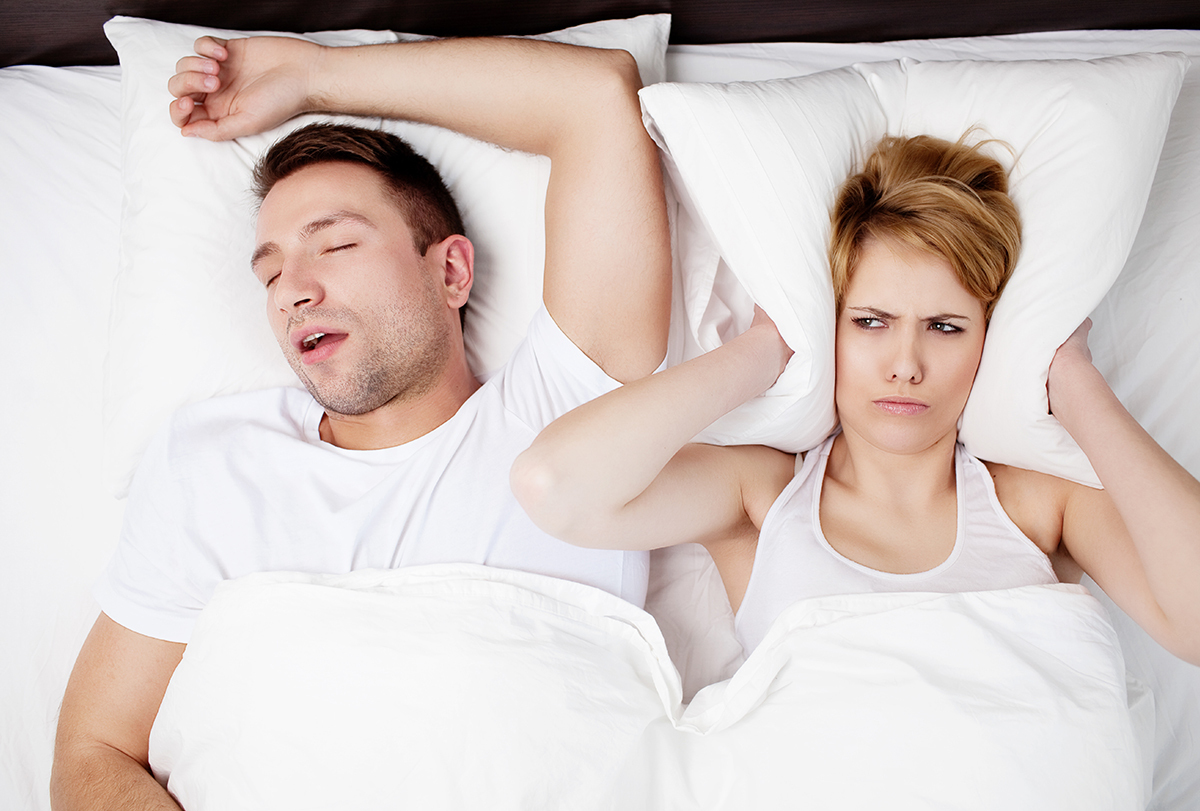
Snoring results from the rough flow of air through the upper airway due to an obstruction in different regions of the pharynx. These obstructions happen because the upper airway muscles fail to dilate during sleep. (1)
Although you may snore every now and then, and it is most of the time nothing to be bothered about, it can cause severe health issues.
These issues are classified into obstructive sleep apnea (a sleep disorder characterized by repetitive episodes of complete or partial upper airway obstruction during sleep) and central sleep apnea (a sleep disorder characterized by pauses in breathing during sleep). Less severe forms include snoring and upper airway resistance syndrome.
The term sleep-disordered breathing is used to encompass all such disorders. (2)(3)
Snoring is often associated with obstructive sleep apnea, although snoring is NOT a sleep disorder in itself.
Snoring can hinder your sleep quality, which can further cause tiredness, testiness, and health issues. Thankfully, there are numerous practical ways to sleep satisfactorily at night and overpower the problem of snoring.
This article will share some solutions to your snoring conundrum.
How to Control Snoring
Although not all remedies work for everyone, there are various methods you can try to see which one is helpful for you.
1. Change your sleeping position
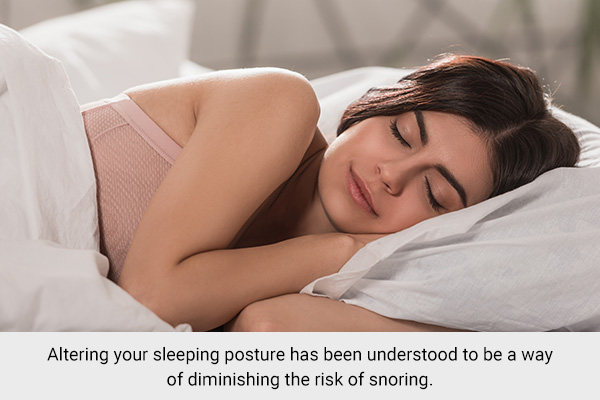
Snoring is a familiar issue that leads to poor sleep quality, heart disorders, mental illnesses, and other difficulties. Altering your sleeping posture has been understood to be a way of diminishing the risk of snoring.
The best way of doing this is by sleeping with the upper body in an inclined position. This is because it opens the upper respiratory tract. (4)
a. Sleep in an inclined position
Sleeping in an inclined position has exhibited reasonable efficaciousness in people who suffer from sleep apnea and other sleep illnesses.
Research has indicated that an inclined sleeping position can lead to a 7% deduction in the snoring period when compared to sleeping in a flat position.
Patients have reported that they felt to have snored less frequently when sleeping in an inclined position. Also, those who sleep with a partner noticed that their partner was less disturbed by their snoring in the inclined position.
To conclude, sleeping with your upper body inclined can be an easy and unobtrusive way of relieving snoring and enhancing sleep quality. (4)
How to sleep in an inclined position:
- Use a bed wedge or an adjustable bed.
- Place the wedge or elevate the head of the bed to a 30–45 degree angle.
- Use pillows to support your neck and upper back and adjust the incline to your comfort level.
b. Sleep on your side
Sleeping on your side can help reduce snoring because it can help with sleep apnea, which is a common cause of snoring.
Positional therapy is a method that can help keep a person sleeping on their side. This can be done using something on the person’s back to prevent them from rolling over, special pillows, or alarms that vibrate when the person rolls onto their back.
Studies have shown that positional therapy is better than doing nothing to reduce snoring and can improve the quality of sleep. However, some people may experience side effects such as sleep disturbance or pain in the back and chest. (5)
2. Give essential oils a try

Treatment for many ailments now incorporates the use of essential oils that have become very famous in recent years. Snoring is a grave social nuance that a lot of people are known to suffer. Statistics show that 40% of men and 25% of women who are above 60 years of age are habitual snorers.
A study was done on snorers where the subjects were randomly assigned to obtain a metered dose of essential oil gargle/spray or a placebo. The results obtained from the study indicated a decline in snoring in those who took a metered dose of either an essential oil gargle or spray.
Therefore, it is safe to conclude that essential oils can be beneficial in treating snoring. Some essential oil you can try to stop snoring include: (6)
- Peppermint oil
- Lemon oil
- Clove oil
- Pine oil
- Fennel
- Sage
- Thyme
- Eucalyptus
- Lavender
- Pine
How to use essential oils for snoring:
- Inhalation: Add a few drops of the essential oil of your choice to a bowl of hot water and inhale the steam before bedtime. Alternatively, you can add a few drops of the oil to a diffuser and inhale the aroma while sleeping.
- Massage: Dilute the essential oil in a carrier oil (such as coconut oil or almond oil) and massage it into the neck and chest before bedtime.
3. Use head-positioning pillows
Head-positioning pillows for sleep apnea are specially designed pillows that help to maintain the head and neck in a specific position to reduce the symptoms of sleep apnea.
These pillows are usually made of foam or memory foam and have a unique shape to provide support and elevation to the head, neck, and shoulders.
Using a head-positioning pillow has been studied to decrease snoring sounds in patients. Obstructive sleep apnea syndrome (OSAS) is a common disorder impacting a good amount of middle-aged folks.
A very well-known sign and symptom of obstructive sleep apnea syndrome include snoring. This can be attributed to pharyngeal collapse with incorrect head positioning that influences snoring.
So, a head-positioning pillow, which is specially developed to get around supine sleep, may help decrease the severity of snoring. (7)
4. Ensure a clean nasal passage
Here are some methods you can employ to ensure a clean and dry nasal passage.
a. Performing nasal irrigation or using a neti pot
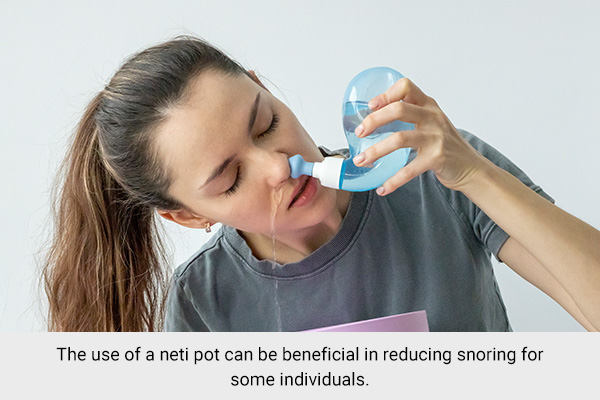
The use of a neti pot can be beneficial in reducing snoring for some individuals. Neti kriya, which involves nasal irrigation using a saline solution, is a traditional cleansing technique in hatha yoga that has been used for centuries to treat upper respiratory tract diseases.
In a study, the practice of sutra neti, a type of nasal irrigation, helped a patient control severe snoring and obstructive sleep apnea, resulting in positive outcomes that lasted for several months.
However, it’s important to use the neti pot properly and with sterile, distilled, or previously boiled water to avoid the risk of infection. (8)
Nasal irrigation can be performed using a variety of methods, including a neti pot, squeeze bottle, or bulb syringe.
How to perform nasal irrigation using a neti pot:
- Fill the neti pot with a saline solution made of sterile, distilled, or previously boiled water and salt.
- Stand over a sink and tilt your head to one side.
- Gently insert the spout of the neti pot into the upper nostril and raise the pot so that the saline solution flows into the nostril and out the other nostril.
- Breathe through your mouth during the process to avoid inhaling the saline solution.
- Repeat the process on the other side, tilting your head in the opposite direction.
b. Keep allergies under control
One study compared sleep problems in people with and without allergic rhinitis (AR), which is a type of allergy that affects the nose and sinuses. The results showed that those with AR had a higher prevalence of sleep problems, including snoring, sleep apnea, and restless sleep.
The study suggested that allergic rhinitis can contribute to snoring and other sleep problems and highlighted the importance of managing allergies to improve sleep quality. (9)
Here are some points on managing allergies: (10)
- Avoid going outdoors during periods of high pollen counts if you are highly allergic to pollen.
- Reduce exposure to fungi by removing sources of moisture and replacing contaminated materials.
- Control humidity in your home.
- Cover bedding with dust mite covers.
- Clean floors with a high-efficiency particulate air vacuum.
- Avoid all contact with animals to avoid animal triggers of allergic rhinitis.
- Several oral and intranasal medications, such as antihistamines, decongestants, corticosteroids, and anticholinergics, may be used for the management of allergic rhinitis. Take medications only after speaking to a healthcare professional.
c. Use a humidifier
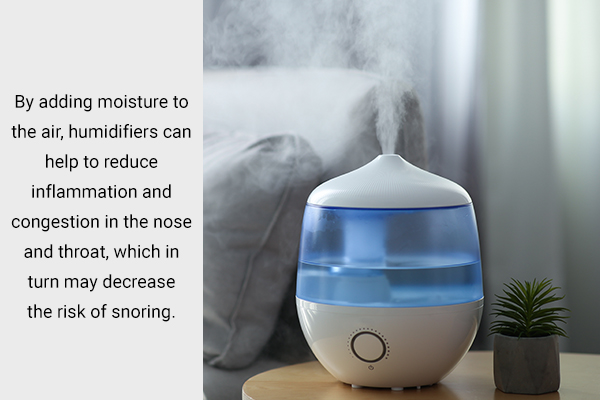
Humidifiers add moisture to the air, which can help to soothe dry nasal passages and throat.
Dry air in the environment can cause irritation in the nose and throat, leading to inflammation and congestion. This inflammation and congestion can restrict the airway, causing snoring.
By adding moisture to the air, humidifiers can help to reduce this inflammation and congestion, which in turn may decrease the risk of snoring.
Humidifiers can be especially helpful for people who live in dry environments. Additionally, people who suffer from allergies or respiratory illnesses, such as sinusitis or asthma, may also benefit from the use of a humidifier. (11)
5. Implement lifestyle changes
Incorporating the following lifestyle changes can help reduce your risk of snoring.
a. Maintain a healthy weight
Obesity is currently a global health hazard. Obesity puts people at an increased risk of snoring. Moreover, the circumference of the neck of people who snore is reported to be particularly higher than those who are nonsnorers.
Controlling and reducing your weight can, therefore, affect your snoring habit. (12)
Research has demonstrated that a habit of snoring was more commonly seen in pre-obese and obese populations when compared to the population with a normal BMI. People with a high BMI who are more prone to obesity have been found to have an elevated threat of obstructive sleep apnea syndrome, snoring, and other sleep-related ailments.
So, it is safe to say that even a subtle reduction in your weight might be efficacious in controlling and lessening the occurrence of snoring.
However, it is important to note that a small decrease in BMI from the obese section to the pre-obese range is not sufficient to treat snoring. You’ve to reduce your BMI to less than 25 kg/m2, which is considered the normal range. (12)
b. Say no to smoking
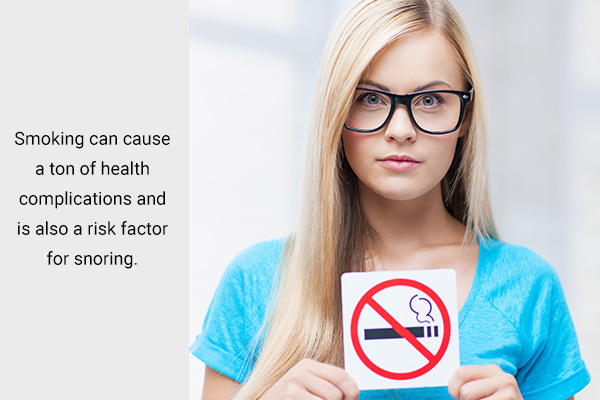
Smoking is a big no-no if you wish to lead a healthy life. Smoking can cause a ton of health complications and is also a risk factor for snoring. Research shows that smoking can be easily linked to an increased prevalence of obstructive sleep apnea or obstructive sleep apnea syndrome.
The reason behind this can be that smoking leads to the narrowing of the upper respiratory tract by causing edema in the uvular mucosa.
Studies have shown that smoking may be an autonomous cause of chronic snoring. Furthermore, the snoring frequency grows when the quantity of cigarettes increases or when the span of exposure to cigarette smoke increases.
So, quitting smoking can support your journey of solving your snoring crisis. (13)
c. Limit your alcohol drinking
Alcohol intake is connected to the deterioration of sleep quality by increasing the severity of snoring, altering the sleep cycle, and lowering oxygen saturation in people who are more prone to suffer from snoring and obstructive sleep apnea.
Studies have shown that snoring gets worse with increased alcohol intake. Alcohol’s impact on snoring and sleep is dose-dependent.
Thus, if you drink heavily or consume multiple drinks regularly, it is time to start limiting your alcohol intake to improve your sleep quality. Experts also advise against drinking alcohol before going to sleep. (14)(15)
What Causes Snoring?
Some common causes of snoring are: (16)
- Thickening of the soft palate
- Narrowing of the airway
- Overweight or obesity
- Long uvula
- Increased alcohol consumption
- Cold
- Sinus or allergies
- Pregnancy
- Deviated septum
- Sleep apnea
Sleep apnea happens when your breathing stops and starts while you sleep. The most common type is called obstructive sleep apnea.
Treatment for sleep apnea is dependent on its cause. If other medical problems are present, such as congestive heart failure or nasal obstruction, sleep apnea may resolve with the treatment of these conditions.
Medical Intervention and Devices
Oral appliances have been studied to reduce snoring by 45%. A variety of oral appliances are available, which include:
- Soft palate lifters, but they’re not in use nowadays
- Tongue-retaining devices, which are used when there’s also a dental reason for snoring
- Mandibular advancement appliances, which are the most common types of oral appliances used today for obstructive sleep apnea
Mandibular advancement appliances are devices that are worn in the mouth during sleep. They work by gently pulling the lower jaw (mandible) forward, which helps to keep the airway open, thereby discouraging any upper airway collapse while you’re asleep.
Since, snoring is an outcome of unnatural anatomy and physiology of the upper respiratory tract, oral appliances such as mandibular advancement appliances can be used to rectify such anomalies. (17)
How to Choose the Best Medical Devices for Snoring?
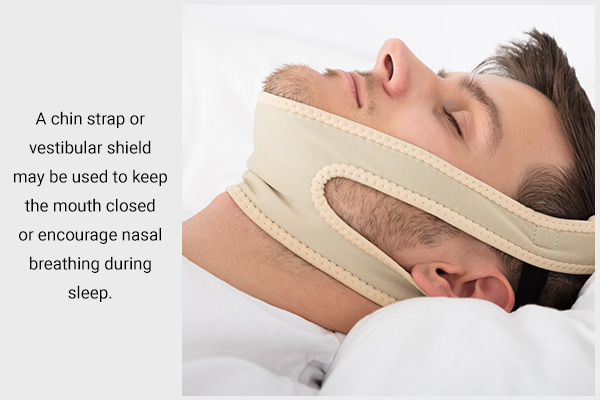
The appropriate treatment for snoring varies depending on the underlying cause, so it’s important to consult a doctor to determine the best approach.
- Tongue obstruction: Using a mandibular advancement device can help move the tongue forward while you sleep.
- Mouth breathing: A chin strap or vestibular shield may be used to keep the mouth closed or encourage nasal breathing during sleep.
- Nasal blockage: Nasal dilators or strips, as well as sprays to reduce swelling, can help keep the airways open.
- Others: If other treatments are not effective, surgery may be recommended to address the issue causing snoring.
Overall, it’s important to identify the specific cause of snoring before deciding on a treatment plan. (18)
Complications Arising From Snoring
Snoring can increase the risk of: (19)
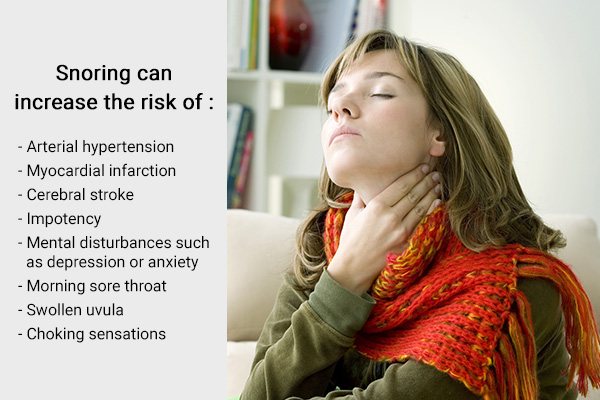
- Arterial hypertension
- Myocardial infarction
- Cerebral stroke
- Impotency
- Mental disturbances such as depression or anxiety
- Morning sore throat
- Swollen uvula
- Choking sensations
When to See a Doctor
Snoring can be due to serious underlying issues. So, habitual snoring should be evaluated professionally, especially if it causes daytime sleepiness or other complications such as:
- Gasping for air while sleeping
- Choking while asleep
- Daytime fatigue
- Morning headaches
Most-Asked Questions About Snoring
How can snoring affect children?
Snoring affects around 6% of children, who can end up having: (19)
- Impaired concentration
- Impaired memory
- Hyperexcitability
- Retarded intellectual development
- Failure of orthodontic treatment
How do you make someone stop snoring while they are sleeping?
Some experts advise gently rolling your partner over on their side and putting a pillow behind them to stop them from rolling on their back.
Does snoring mean deep sleep?
Snoring does not always mean deep sleep. Many times, it can simply be because of an underlying sleep disorder.
Do more pillows stop snoring?
For some people, using more pillows may help to lift their head and prevent snoring, but not everyone can benefit from it.
What sleeping positions make snoring worse?
Experts say that sleeping on your back can be the worst position for some snorers.
What are the types of snoring?
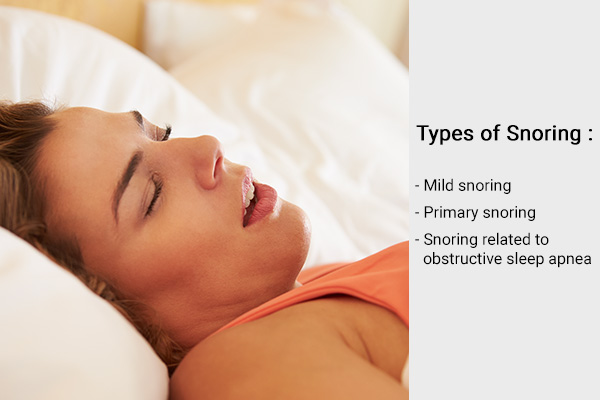
The types of snoring based on frequency and severity are: (20)
- Mild snoring: Occasional, light snoring is common and usually doesn’t require medical intervention.
- Primary snoring: Primary snoring occurs frequently, more than three nights a week. It can be bothersome to bed partners and may warrant medical attention if it causes sleep disturbances or is associated with sleep apnea.
- Snoring related to obstructive sleep apnea: Snoring that is linked to obstructive sleep apnea is more concerning. Untreated sleep apnea can lead to significant health issues. It’s crucial to seek medical treatment for this type of snoring to prevent potential health complications.
Final Word
Snoring can occasionally have unfavorable and adverse health outcomes, so you should not just ignore it or laugh it off.
If you are a regular snorer, it’s highly advised to determine its underlying cause and to determine if it’s an indication of a severe medical illness. Talk to your doctor about your symptoms.
- Was this article helpful?
- YES, THANKS!NOT REALLY


